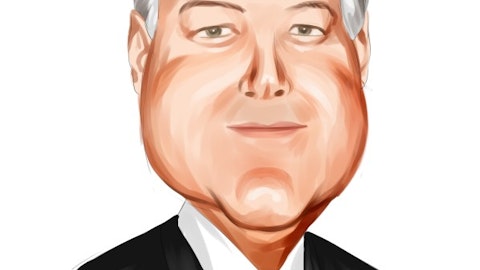In this piece we take a look at the five best virtual reality stocks to buy. For more stocks, head on over to 11 Best Virtual Reality Stocks to Buy.
5. QUALCOMM Incorporated (NASDAQ:QCOM)
Number of Hedge Fund Holders: 71
QUALCOMM Incorporated (NASDAQ:QCOM) is an American company that designs and sells a host of semiconductor products such as central processing units, graphics processing units, and modems for smartphones. It is headquartered in San Diego, California.
QUALCOMM Incorporated (NASDAQ:QCOM)’s products sit at the heart of AR and VR software and hardware since they power the gadgets that run the computationally intensive artificial realities. Its Snapdragon X51, 820, 835, 845, and 855 processors are all capable of powering VR applications. Additionally, the firm’s Wireless AR Smart Reference Design provides a platform for companies to develop and design augmented reality smart glasses for uses with applications such as metaverses.
QUALCOMM Incorporated (NASDAQ:QCOM)’s Snapdragon products also power all major existing VR headsets, and the firm has set aside $100 million to develop the technologies. Insider Monkey studied 895 hedge fund portfolios for this year’s second quarter to discover that 71 had held a stake in the company.
QUALCOMM Incorporated (NASDAQ:QCOM)’s largest investor in our database is Panayotis Takis Sparaggis’s Alkeon Capital Management which owns 4.2 million shares that are worth $541 million.
4. NVIDIA Corporation (NASDAQ:NVDA)
Number of Hedge Fund Holders: 84
NVIDIA Corporation (NASDAQ:NVDA) is one of the largest semiconductor designers and sellers in the world that is primarily known for its graphics processing units (GPUs). These are used in a variety of applications such as running video games and artificial intelligence algorithms.
NVIDIA Corporation (NASDAQ:NVDA)’s GeForce GPUs are the market leaders when it comes to computing heavy duty applications such as virtual reality platforms and metaverses. The firm complements its hardware with its gaming streaming service GeForce Now, and it also provides software to support cloud based virtual computing.
NVIDIA Corporation (NASDAQ:NVDA) is also a key player in the application of virtual reality for enterprise use cases. The firm’s Omniverse platform is a cloud based development network that lets companies create immersive virtual worlds. By the end of this year’s second quarter, 84 out of the 895 hedge funds polled by Insider Monkey had invested in NVIDIA Corporation (NASDAQ:NVDA).
Out of these, Ken Fisher’s Fisher Asset Management is NVIDIA Corporation (NASDAQ:NVDA)’s largest investor through a $1.1 billion stake that comes via 7.5 million shares.
3. Advanced Micro Devices, Inc. (NASDAQ:AMD)
Number of Hedge Fund Holders: 87
Advanced Micro Devices, Inc. (NASDAQ:AMD) is an American company that designs and sells GPUs and CPUs. These are used by gamers to run video games, by content creators to develop their products, and by companies to power their data centers. The firm also manufactures CPUs and GPUs for gaming consoles.
Advanced Micro Devices, Inc. (NASDAQ:AMD) is another company whose products are essential for a smooth virtual reality experience. The firm’s Ryzen CPUs and its Radeon GPUs, used in personal computers and laptops, are fully capable of running AR and VR applications. Additionally, it also provides its LiquidVR technology that enables developers to create virtual reality platforms by providing them access to certain GPU features such as acoustics rendering and asynchronous data upload.
Insider Monkey analyzed the holdings of 895 hedge funds during this year’s June quarter to discover that 87 had held a stake in Advanced Micro Devices, Inc. (NASDAQ:AMD).
Advanced Micro Devices, Inc. (NASDAQ:AMD)’s largest investor is Ken Fisher’s Fisher Asset Management which owns 25 million shares that are worth $1.9 billion.
2. Meta Platforms, Inc. (NASDAQ:META)
Number of Hedge Fund Holders: 184
Meta Platforms, Inc. (NASDAQ:META) is the holding company for the world’s largest social network Facebook, and other social platforms such as Instagram and WhatsApp. The company is headquartered in Menlo Park, California.
Meta Platforms, Inc. (NASDAQ:META) is taking an all out approach toward developing the metaverse. Through its social network Facebook, which has one of the largest user bases in the world, the company aims to create a virtual world where users can interact with each other and even with its chief executive officer Mr. Mark Zuckerberg.
Meta Platforms, Inc. (NASDAQ:META) also sells a virtual reality headset called the Meta Quest Pro, which lets users immerse themselves in a virtual reality environment. The company has also partnered with NBC to provide virtual experiences to Quest users. 184 out of the 895 hedge funds polled by Insider Monkey during this year’s second quarter had invested in the company.
Meta Platforms, Inc. (NASDAQ:META)’s largest investor is Ken Fisher’s Fisher Asset Management which owns 11.5 million shares that are worth $1.8 billion.
Rowan Street Capital mentioned the company in its Q2 2022 investor letter. Here is what the fund said:
“Meta Platforms, Inc. (NASDAQ:META) gets a lot of negative news coverage, and there has been a general negative sentiment floating around the company for some time. But let’s take a look at what’s “under the hood”. In recent quarter, Family of Apps daily active people hit 2.88 billion, while monthly active people grew to 3.65 billion — these are mind-boggling numbers. In the past 12 months, they earned $33.20 in revenue per user, which amounted to $118 billion in total revenues. On that, they generated almost $40 billion in operating profits (34% operating margin) and $58.5 billion in operating cash flow. That is far from a disaster! In the most recent quarter, investors have been concerned that total revenues declined 1% (Y/Y) and are estimated to decline 6% (Y/Y) in Q3, which reflects weak advertising demand. At the same time, Meta is continuing to reinvest in its business with total expenses growing 22% (Y/Y) in Q2, which caused operating profit and earnings per share (EPS) to decrease 32%. Meta is in the midst of an economic cycle that is having a broad impact on the digital advertising business. They are being disciplined on spending while still investing in those areas that will position to drive growth as the economic environment improves.
1. Microsoft Corporation (NASDAQ:MSFT)
Number of Hedge Fund Holders: 258
Microsoft Corporation (NASDAQ:MSFT) is one of the world’s largest technology companies. Primarily known for its Windows operating system, the firm also sells gaming consoles, virtual reality products, and notebooks. It is headquartered in Redmond, Washington, the United States.
Microsoft Corporation (NASDAQ:MSFT) sells some of the most advanced virtual reality headsets in the world. These include its HP Reverb G2 headset, which allows gamers to play a wide variety of VR games such as Half Life: Alyx, Star Wars, and The Walking Dead: Saints & Sinners. Microsoft Corporation (NASDAQ:MSFT)’s HoloLens 2 headset is targeted towards a wider use base such as manufacturing, engineering, education, and healthcare. The firm claims to have helped aerospace giant Lockheed Martin improve its assembly manufacturing process by 90% and automaker Mercedes-Benz improve technician efficiency by 40% through the HoloLens 2. The HoloLens also let the National Aeronautics and Space Administration (NASA) virtually teleport a doctor to the International Space Station (ISS).
258 out of the 895 hedge funds part of Insider Monkey’s Q2 2022 survey had bought Microsoft Corporation (NASDAQ:MSFT)’s shares.
Out of these, Ken Fisher’s Fisher Asset Management is Microsoft Corporation (NASDAQ:MSFT)’s largest investor. It owns 28 million shares that are worth $7.3 billion.
Lakehouse Capital mentioned the company in its Q3 2022 investor letter. Here is what the fund said:
“During the month, the Fund initiated a new position in Microsoft Corporation (NASDAQ:MSFT), a name that is no doubt familiar to our investors. The company was founded by Bill Gates and Paul Allen in a friend’s garage in 1975 and began dominating the operating system market with MS-DOS by the mid-1980s. The company has come a long way since then and is now widely considered the most critical and indispensable IT mega-vendor for businesses globally. In addition to its well-known Windows operating systems and Office productivity suite, the company has a broad portfolio of strategic products, including a rapidly growing public cloud business in Azure and a sizeable gaming presence.
Disclosure: None. You can also take a look at 10 Best Delivery Stocks to Invest In and 10 Best EV Battery Stocks to Buy in Late 2022.



